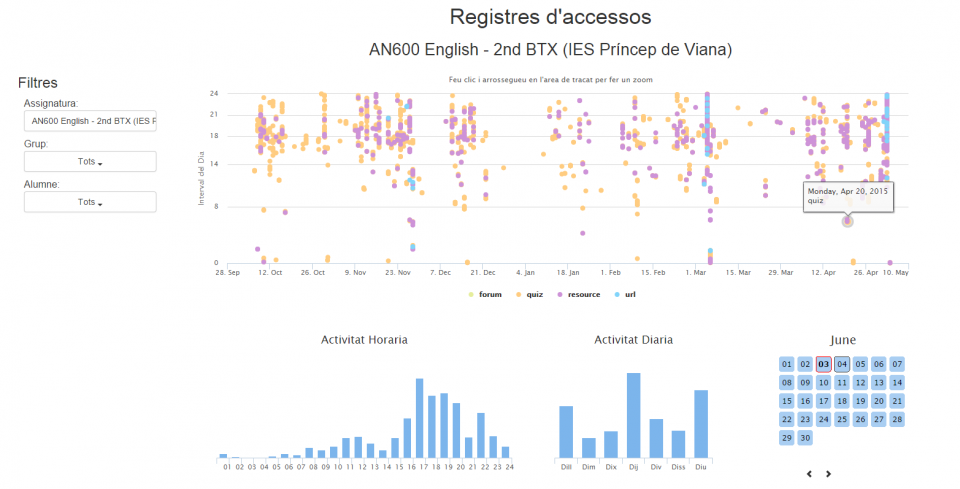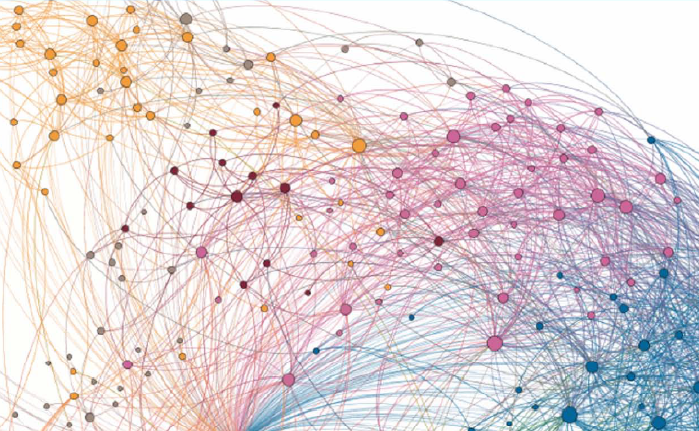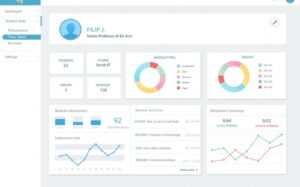Learning analytics – PILARES
- Maria Casadevall Muné
- Jordi Vivancos Martí
- Eva Patricia Gil Rodríguez
- Jordi Giralt Baldellou
- Java, MongoDB, Moodle, MySQL, R, Statistics and Computing
Home » Success Stories »
Description
The PILARES Project is an Intelligent Learning Analytics Platform to improve the operation of Secondary Education
This project establishes the basis for designing a Learning Analytics platform to improve functioning in Secondary Education that considers the needs of stakeholders, existing educational standards and concepts, and trends in improved ICT learning environments in Spanish secondary schools.
The research team has also been in contact with national researchers in the area (becoming members of the SNOLA community) and international researchers (through LAK conferences).
In the execution of PILARES, we achieve all of the following objectives:
- Obtain the needs of secondary education stakeholders. To do this, we have formed a group of secondary schools and teachers, putting a pilot group of stakeholders (a secondary school teacher and a representative of the Department of Education of the Generalitat) to carry out in-depth interviews and the design specific scripting on these growing data methods. We focus on the use of LMS (Moodle) in the school to identify appropriate indicators for learning student tracking. A report of all interviews and a summary has been created.
- Identify existing educational concepts and norms as a basis for effective understanding, comparison and aggregation of educational data, translating them into a formal ontology. Based on the needs identified above and the information available in the Moodle tables, we are identifying the educational concepts of the LMS tables as the basis for effective understanding, comparison and aggregation of educational data. From here, we will specify an integrated ontology (eg conceptual schema) of the main concepts needed to assess the needs of students and teachers regarding Moodle learning processes.
- Identify trends in Smart Learning Environments in Spanish secondary schools. We analyze the current trends on Smart Learning Environments in Spanish secondary schools, the expected learning features that may appear, the evaluation and supervision needs and the characteristics that may be required of an Analytical Study platform to support the interoperability of new digital environments.

On the other hand, the collaboration with the UPCnet company (UPCNET2013-3 project and PILARES project collaborator) has been focused on identifying the way in which the Analytical Study could be used to improve products and services based on Moodle. Effort has also been focused on data extraction procedures and the design of visualization tools that could be used to demonstrate potential benefits. Figure 1 shows the access graph of a subject participating in the PILARES pilot test.
Based on our promising initial results on the motivational assessment of beginners based on data obtained from the LMS, our proposal will be mainly focused on the analytical behavior of the learning process.
The data used during the project will be obtained from selected secondary schools that use AGORA, a large LMS system based on Moodle used by 90% of secondary schools in Catalonia. For this reason, UPC and the Department of Education of the Generalitat of Catalonia have signed an agreement that includes participation in pilot tests, the participation of educational experts in research projects as part of the research team (or as external advisers) and access to digital data from the AGORA platform for research purposes. This institutional platform is a Moodle-based platform that offers services and content to more than 1,500 schools and 400,000 students.
PILARES was presented in the so-called “I+D+I Projects – Excellence 2013” and financed by the Ministry of Economy and Competitiveness, Research, Development and Innovation – the Spanish Technical Excellence Research Program – with a provisional grant of one year (“ayuda puente”). The current PILARES project is being executed during 2015.


